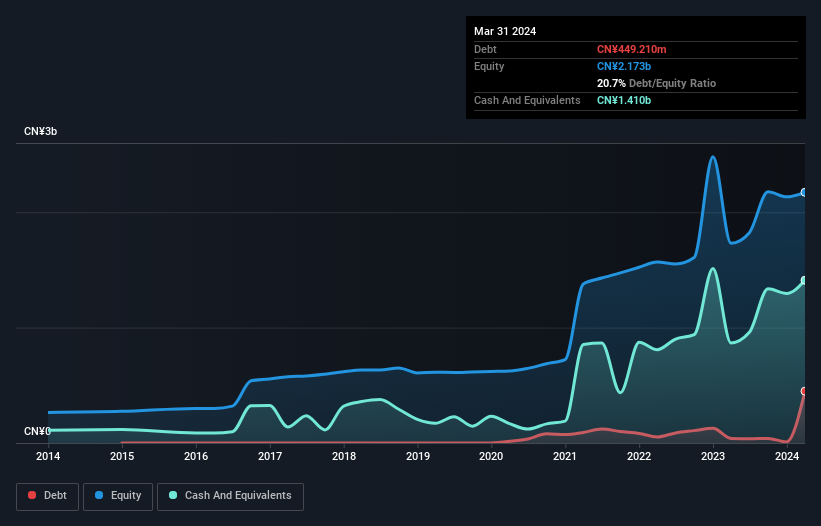- China
- /
- Communications
- /
- SZSE:300548
Broadex Technologies (SZSE:300548) Has Debt But No Earnings; Should You Worry?
Some say volatility, rather than debt, is the best way to think about risk as an investor, but Warren Buffett famously said that 'Volatility is far from synonymous with risk.' It's only natural to consider a company's balance sheet when you examine how risky it is, since debt is often involved when a business collapses. As with many other companies Broadex Technologies Co., Ltd. (SZSE:300548) makes use of debt. But should shareholders be worried about its use of debt?
When Is Debt A Problem?
Debt and other liabilities become risky for a business when it cannot easily fulfill those obligations, either with free cash flow or by raising capital at an attractive price. In the worst case scenario, a company can go bankrupt if it cannot pay its creditors. However, a more usual (but still expensive) situation is where a company must dilute shareholders at a cheap share price simply to get debt under control. Of course, debt can be an important tool in businesses, particularly capital heavy businesses. When we examine debt levels, we first consider both cash and debt levels, together.
See our latest analysis for Broadex Technologies
How Much Debt Does Broadex Technologies Carry?
As you can see below, at the end of March 2024, Broadex Technologies had CN¥449.2m of debt, up from CN¥40.0m a year ago. Click the image for more detail. But it also has CN¥1.41b in cash to offset that, meaning it has CN¥961.0m net cash.

A Look At Broadex Technologies' Liabilities
According to the last reported balance sheet, Broadex Technologies had liabilities of CN¥542.8m due within 12 months, and liabilities of CN¥532.4m due beyond 12 months. On the other hand, it had cash of CN¥1.41b and CN¥467.2m worth of receivables due within a year. So it actually has CN¥802.2m more liquid assets than total liabilities.
This short term liquidity is a sign that Broadex Technologies could probably pay off its debt with ease, as its balance sheet is far from stretched. Simply put, the fact that Broadex Technologies has more cash than debt is arguably a good indication that it can manage its debt safely. When analysing debt levels, the balance sheet is the obvious place to start. But ultimately the future profitability of the business will decide if Broadex Technologies can strengthen its balance sheet over time. So if you're focused on the future you can check out this free report showing analyst profit forecasts.
In the last year Broadex Technologies had a loss before interest and tax, and actually shrunk its revenue by 22%, to CN¥1.5b. To be frank that doesn't bode well.
So How Risky Is Broadex Technologies?
While Broadex Technologies lost money on an earnings before interest and tax (EBIT) level, it actually booked a paper profit of CN¥39m. So taking that on face value, and considering the cash, we don't think its very risky in the near term. With mediocre revenue growth in the last year, we're don't find the investment opportunity particularly compelling. When analysing debt levels, the balance sheet is the obvious place to start. But ultimately, every company can contain risks that exist outside of the balance sheet. To that end, you should be aware of the 2 warning signs we've spotted with Broadex Technologies .
When all is said and done, sometimes its easier to focus on companies that don't even need debt. Readers can access a list of growth stocks with zero net debt 100% free, right now.
Valuation is complex, but we're here to simplify it.
Discover if EverProX Technologies might be undervalued or overvalued with our detailed analysis, featuring fair value estimates, potential risks, dividends, insider trades, and its financial condition.
Access Free AnalysisHave feedback on this article? Concerned about the content? Get in touch with us directly. Alternatively, email editorial-team (at) simplywallst.com.
This article by Simply Wall St is general in nature. We provide commentary based on historical data and analyst forecasts only using an unbiased methodology and our articles are not intended to be financial advice. It does not constitute a recommendation to buy or sell any stock, and does not take account of your objectives, or your financial situation. We aim to bring you long-term focused analysis driven by fundamental data. Note that our analysis may not factor in the latest price-sensitive company announcements or qualitative material. Simply Wall St has no position in any stocks mentioned.
Have feedback on this article? Concerned about the content? Get in touch with us directly. Alternatively, email editorial-team@simplywallst.com
About SZSE:300548
EverProX Technologies
Researches and develops, produces, and sells integrated optoelectronic devices in the field of optical communications in China and internationally.
High growth potential with excellent balance sheet.
Market Insights
Community Narratives



